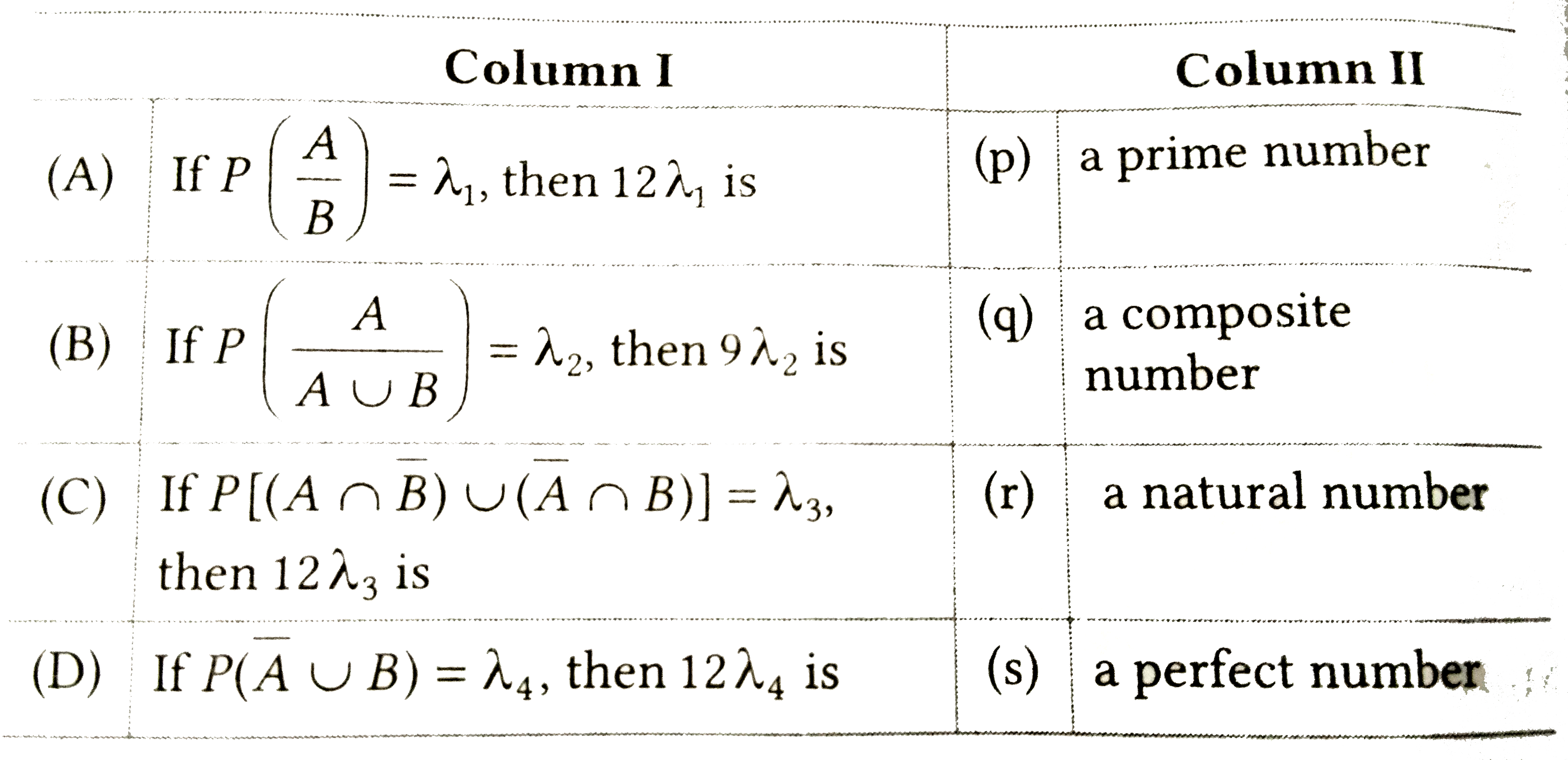If A and B be independent events with P(A)=14and(P(A∪B)=2P(B)−P(A) , then P(B) is equal to
25
15
35
None of these
The correct Answer is:A
To solve the problem, we need to find the probability P(B) given the conditions of the events A and B.
1. Understand the Given Information:
- We know that P(A)=14.
- We also have the equation P(A∪B)=2P(B)−P(A).
2. Use the Formula for Independent Events:
- For independent events, the formula for the probability of the union of two events is:
P(A∪B)=P(A)+P(B)−P(A)P(B)
3. Substitute the Known Values:
- Substitute P(A) into the formula:
P(A∪B)=14+P(B)−(14⋅P(B))
4. Set the Two Expressions for P(A∪B) Equal:
- We have two expressions for P(A∪B):
14+P(B)−14P(B)=2P(B)−14
5. Simplify the Left Side:
- Combine the terms on the left side:
14+P(B)−14P(B)=14+P(B)(1−14)=14+34P(B)
6. Set the Equation:
- Now we set the left side equal to the right side:
14+34P(B)=2P(B)−14
7. Rearranging the Equation:
- Move all terms involving P(B) to one side and constant terms to the other:
14+14=2P(B)−34P(B)
12=54P(B)
8. Solve for P(B):
- Multiply both sides by 45:
P(B)=1/2⋅45=25
Final Answer:
Thus, P(B)=25.
---
- We know that P(A)=14.
- We also have the equation P(A∪B)=2P(B)−P(A).
- For independent events, the formula for the probability of the union of two events is:
P(A∪B)=P(A)+P(B)−P(A)P(B)
- Substitute P(A) into the formula:
P(A∪B)=14+P(B)−(14⋅P(B))
- We have two expressions for P(A∪B):
14+P(B)−14P(B)=2P(B)−14
- Combine the terms on the left side:
14+P(B)−14P(B)=14+P(B)(1−14)=14+34P(B)
- Now we set the left side equal to the right side:
14+34P(B)=2P(B)−14
- Move all terms involving P(B) to one side and constant terms to the other:
14+14=2P(B)−34P(B)
12=54P(B)
- Multiply both sides by 45:
P(B)=1/2⋅45=25
Thus, P(B)=25.
Topper's Solved these Questions
- BOOK - ICSECHAPTER - MODEL TEST PAPER - 3 EXERCISE - SECTION - B10videos
MODEL TEST PAPER - 3
- BOOK - ICSECHAPTER - MODEL TEST PAPER - 3 EXERCISE - SECTION - C10videos
MODEL TEST PAPER - 3
- BOOK - ICSECHAPTER - MODEL TEST PAPER - 2EXERCISE - Section - C10videos
MODEL TEST PAPER - 2
- BOOK - ICSECHAPTER - MODEL TEST PAPER - 4EXERCISE - SECTION - C10videos
MODEL TEST PAPER - 4
Similar Questions
Knowledge Check
- Question 1 - Select One
If A and B are two independent events with P(A) =13andP(B)=14 , then P(B/A) is equal to
A14B13C34D1 - Question 2 - Select One
If A and B are two independent events with P(A)=35andP(B)=49 then P(A∩B) is equal to:
A415B845C13D29 - Question 3 - Select One
If A and B are independent events thenP(A∩B) is equal to
AP(A)+P(B)BP(A)−P(B)CP(A).P(B)DP(A)P(B)
If A and B' are independent events, then P(A'∪B)=1−P(A)P(B').
View SolutionIf A and B are two independent events, such that P(A)=13andP(B)=14.
 View Solution
View SolutionA and B are two independent events such that P(A) = 0.8 and P(A∩→B)=0.3 Find P(B)
View SolutionIf A and B are two events such that P(A)=14,P(A/B)=12andP(B/A)=23 then P(B) is equal to
View SolutionIf A and B are two events such that P(A)=12,P(B)=13andP(A/B)=14 then P(A∩B) is equal to
View Solution

